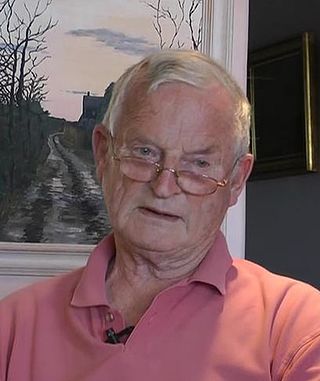
Admiral Sir John Forster "Sandy" Woodward, was a senior Royal Navy officer who commanded the Task Force of the Falklands War.

Admiral Sir Victor Alexander Charles Crutchley was a British naval officer.

The Commander-in-Chief Fleet (CINCFLEET) was the admiral responsible for the operations of the ships, submarines and aircraft of the British Royal Navy from 1971 until April 2012. The post was subordinate to the First Sea Lord, the professional head of the Naval Service. In its last years, as the Navy shrank, more administrative responsibilities were added.

Admiral of the Fleet John David Elliott Fieldhouse, Baron Fieldhouse, was a Royal Navy officer. He commanded five submarines and a frigate before achieving higher command from the 1970s. Following the invasion of the Falkland Islands by Argentine forces in April 1982, Fieldhouse was appointed Commander of the Task Force given responsibility for "Operation Corporate", the mission to recover the Falkland Islands. The campaign ended in the surrender of Argentine forces in June 1982. He became First Sea Lord and Chief of Naval Staff in December that year and, in that role, persuaded the British Government to fund the replacement of ships lost in the Falklands War. He went on to be Chief of the Defence Staff from 1985 until his retirement in 1988.
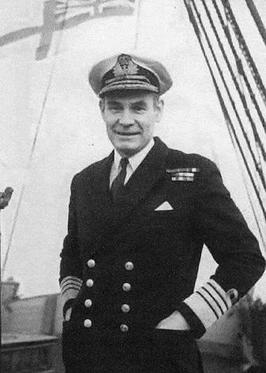
Admiral of the Fleet Terence Thornton Lewin, Baron Lewin, was a Royal Navy officer. He served in the Second World War and then commanded a destroyer, the Royal yacht, two frigates and an aircraft carrier before achieving higher command. He was First Sea Lord and Chief of the Naval Staff in the late 1970s and in that role he worked hard to secure a decent wage for servicemen and helped win them a 32% pay rise. He went on to be Chief of the Defence Staff during the Falklands War, serving as chief war planner and as Prime Minister Margaret Thatcher's chief advisor during the war. He was also the first Chief of Defence Staff to act as professional head of the Armed Forces rather than just Chairman of the Chiefs of Staff Committee.

Admiral of the Fleet Sir Henry Conyers Leach, was a Royal Navy officer who, as First Sea Lord and Chief of the Naval Staff during the early 1980s, was instrumental in convincing the British prime minister Margaret Thatcher that retaking the Falkland Islands from Argentina was feasible. On account of the determination he showed in the matter, journalist and political commentator Andrew Marr described him as Thatcher's "knight in shining gold braid".

British Forces Gibraltar constitute those elements of the British Armed Forces stationed in the British overseas territory of Gibraltar. Gibraltar is used primarily as a training area, thanks to its good climate and rocky terrain, and as a stopover for aircraft and ships en route to and from deployments East of Suez or in Africa.
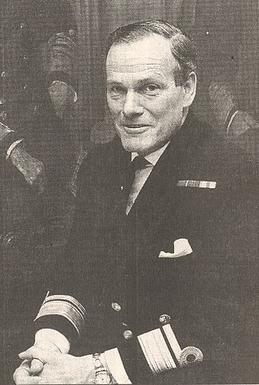
Admiral of the Fleet Sir William Doveton Minet Staveley was a Royal Navy officer. Staveley saw service as a minesweeper commander on coastal patrol during the Indonesia–Malaysia confrontation before commanding a frigate and then an aircraft carrier and ultimately achieving higher command in the Navy. He served as First Sea Lord and Chief of Naval Staff in the late 1980s. In that role he fought hard for a fleet large enough to meet NATO commitments.

The Commander-in-Chief South Atlantic was an operational commander of the Royal Navy from 1939. The South American area was added to his responsibilities in 1960, and the post disestablished in 1967.
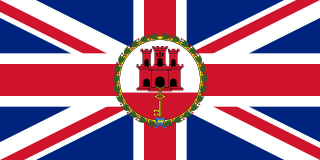
Admiral Sir Hugo Moresby White, was a senior officer of the Royal Navy and subsequently Governor of Gibraltar.

Sir Anthony Peter Woodhead, is a former Royal Navy officer who served as Deputy Supreme Allied Commander Atlantic from 1991 to 1993.

Admiral Sir Randolph Stewart Gresham Nicholson, was a Royal Navy officer who became Lieutenant-Governor of Jersey.

The Assistant Chief of the Naval Staff (Aviation, Amphibious Capability & Carriers) formerly the Assistant Chief of the Naval Staff (Aviation and Carrier Strike) is a senior Royal Navy appointment responsible for naval aviation. The post is also the successor to the Royal Navy's Flag Officer for naval aviation in the British Isles, established since 1939.
In 1989 the Royal Navy was under the direction of the Navy Department in the UK Ministry of Defence. It had two main commands, CINCFLEET and Naval Home Command.

Flag Officer, Carriers and Amphibious Ships (FOCAS) was a senior Royal Navy post that existed from 1970 to 1979. However, its antecedents date to 1931.

The Flag Officer, Third Flotilla was the senior Royal Navy appointment in command of the Third Flotilla from 1979 to 1992.
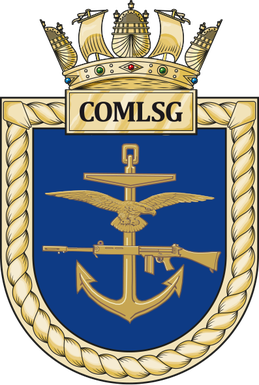
The Commander Littoral Strike Group (COMLSG) is a senior British Royal Navy Amphibious warfare appointment. COMLSG, who is based in Stonehouse Barracks, Stonehouse, Plymouth, reports to Commander United Kingdom Strike Force. It was first established in 1971 as Commodore Amphibious Warfare.
Commodore Michael Cecil Clapp, is a retired senior Royal Navy officer who commanded the United Kingdom's amphibious assault group, Task Group 317.0, in the Falklands War.
Rear-admiral Sir Peter George Valentin Dingemans, was a former Royal Navy officer who was captain of HMS Intrepid during the Falklands War and went on to become Chief of staff to the Commander-in-Chief Fleet.















